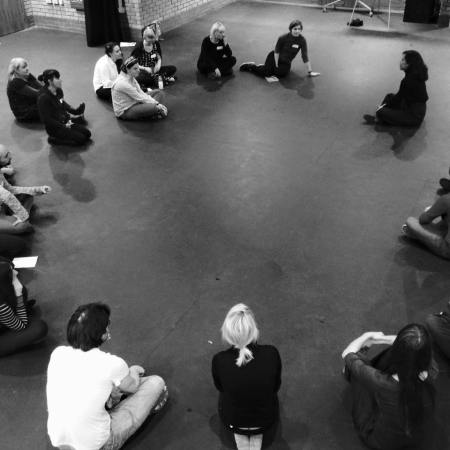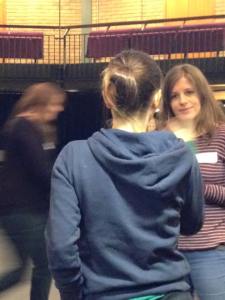News
28 January 2016 / Blogs
NRN Blog: Teaching Theatre Practice

Poppy Corbett reflects on our teaching practice event in December. Poppy is a playwright and Visiting Lecturer in Creative Writing at Royal Holloway University of London. She co-wrote (with educationalist Pie Corbett) The Enormous Book of Talk for Writing Games for KS2 teachers – a book that can be used to help children improve their written work through speech and drama games. In 2014 she won a College Teaching Excellence prize.
Until very recently Poppy was also a member of the NRN Committee, and we’d just like to thank Poppy for all her hard work with us!
In December 2015 the STR NRN held a practical workshop day ‘Teaching Theatre Practice’ designed to build practical drama teaching skills. As a committee member I was lucky enough to take part in two out of the three sessions. It’s always inspiring to witness the teaching of more senior academics and hear their top tips. I came away with new ideas about teaching practice:
1. Use simple language.

This was great advice from Melissa Blanco Borelli, Senior Lecturer at RHUL who led the first session. During her session (in which she taught us as though we were first year students) she highlighted the importance of using simple, non-threatening language to describe complex exercises. As an example, the first thing she asked us to do was to ‘draw your name using your body and then teach it to a partner’. This sounded much more fun and achievable than what she was actually asking us to do, something along the lines of ‘create a repeatable dance movement sequence and then teach your partner that somatic notation’. This was an excellent reminder in the importance of adapting your language to frame practical exercises so that students feel what is being asked of them is within the realms of possibility. Sneak difficult work in under simple instruction.
2. Act neutral.

During a discussion concerning the way to respond to students’ work Borelli emphasised the usefulness of remaining neutral at times. For example, if tension is high or students are nervous, sometimes it is more useful to ask them neutral questions about the work rather than offering them a judgemental opinion. So beginning a response with the words ‘I didn’t quite understand what you were doing in that section…’ is more helpful than ‘what you were doing there looked weird and awful’. As teachers we are programmed to make value judgements on students work, but sometimes, in order for them to feel valued and to really learn something, it may be more useful to neutrally ask them for clarification.
3. If in doubt: describe.

To follow from the previous point, Borelli indicated the value of improving your own language of performance analysis. Sometimes students can make work that may appear relatively confusing if you were not involved in the process. What can be useful here is simply describing back to them what you, in the position of an audience member, saw and heard whilst watching their performance. Even if you are lost for critical words at the durational mushroom-eating dance piece from your experimental third years you will still be able to offer an objective description of what you viewed. Often, this can prove to be the most useful feedback if the performance that you say you witnessed does not corroborate with their own dramatic intentions.
4. It’s all in the shoes.

The final session of the day was led by Simon Ruding, director of The Theatre in Prisons and Probation Research and Development Centre, based at the University of Manchester. Simon led us in a simple exercise that I’ll now always use when working with new groups. Very simply, we each had to tell the story of our shoes (where we bought them from, how old they are etc). This generated lots of laughs – it turns out own several participants had stolen their shoes from other people! It proved to be a fantastic exercise to use with a new group for several reasons. Firstly, everyone’s shoe story revealed something unique about their personality and circumstance – a quick way to understand what type of group you are working with. Secondly, it was a simple enough task that can be used with diverse groups of students – no one has to be a brainy scientist to join in with this exercise. Thirdly, as pointed out by one of the participants, it took the focus away from having to look in people’s eyes, to being able to talk whilst looking down at your feet – perfect for more reticent participants! A fun and fruitful exercise that I’m already thinking about transposing to creative writing classes: “Tell us the story of your pen, how did you come to enquire it…?”
5. Get political.

The final idea that I took from Ruding’s session was not to be shy in sharing my own politics with a seminar group. Ruding made it clear that if he was going to be working in prisons with students, he wanted them to know his own political and social theories regarding the work they were doing, to allow them to form a deeper understanding of the potential importance and impact of their work. This is problematic advice. In my teacher training we were told to remain neutral: you never know the background, politics or personal circumstance of the students you teach. It can be very easy to offend someone! I therefore try to keep my teaching about the work, not about my own feelings or opinions. However, Ruding’s attitude made me rethink my own stance. Particularly, because I teach playwriting and when you write a play you are engaging with the way you feel about the world. Politics is central to the Humanities and perhaps I should share some of my own views about certain plays, or how the theatre industry operates. Perhaps I should stand up at the start of the seminar and advocate the Act For Change movement and admonish West End ticket prices. Who knows, like Ruding’s session itself, it could even be a little bit inspiring…